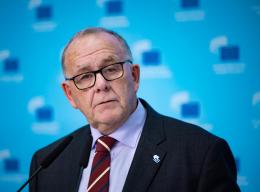European Economic
and Social Committee
Main navigation
-
Par mums
ABOUT
The European Economic and Social Committee (EESC) is the voice of organised civil society in Europe.
Find out more about its role and structure at http://www.eesc.europa.eu/en/about
- Politiskā struktūra
- Administratīvā struktūra
- SADARBĪBA AR CITĀM IESTĀDĒM
- Rules
-
Mūsu darbs
OUR WORK
The EESC issues between 160 and 190 opinions and information reports a year.
It also organises several annual initiatives and events with a focus on civil society and citizens’ participation such as the Civil Society Prize, the Civil Society Days, the Your Europe, Your Say youth plenary and the ECI Day.
Find the latest EESC opinions and publications at http://www.eesc.europa.eu/en/our-work/opinions-information-reports/opinions and http://www.eesc.europa.eu/en/our-work/publications-other-work/publications respectively.
- Atzinumi un informatīvi ziņojumi
- Dokumenti
- Publikācijas un citi darbi
-
Pilsoniskās sabiedrības un pilsoņu līdzdalība
- Civil Society Week
- European elections 2024
- Balva pilsoniskajai sabiedrībai
- The Conference on the Future of Europe
- Eiropas demokrātijas pase
- Jūsu Eiropa, jūsu lēmumi!
- Eiropas pilsoņu iniciatīva (EPI)
- The path to our industrial future
- Youth Climate and Sustainability Round Tables
- EU Organic Awards
- Civil Society Against COVID 19
- EESC stands with Ukraine
- Partnerships
- Relations with ESCs
-
Politikas jomas
POLICIES
The EESC is active in a wide range of areas, from social affairs to economy, energy and sustainability.
Learn more about our policy areas and policy highlights at http://www.eesc.europa.eu/en/policies
-
Politikas jomas
- Lauksaimniecība, lauku attīstība un zivsaimniecība
- Klimata politikas pasākumi
- Kohēzijas politika, reģionālā politika un pilsētpolitika
- Patērētāji
- Digitālās pārmaiņas un informācijas sabiedrība
- Ekonomiskā un monetārā savienība
- Izglītība un apmācība
- Nodarbinātība
- Enerģētika
- Uzņēmējdarbība
- Vide
- Ārējās attiecības
- Finanšu pakalpojumi un kapitāla tirgi
- Pamattiesības un pilsoņu tiesības
- Housing
- Rūpniecība un rūpniecības pārmaiņas
- Institucionālās lietas un ES budžets
- Migrācija un patvērums
- Pētniecība un inovācija
- Vispārējas nozīmes pakalpojumi
- Vienotais tirgus
- Sociālās lietas
- Ilgtspējīga attīstība
- Nodokļu sistēma
- Transports
-
Aktuāli
- Call to EU candidate countries civil society
- EESC stands with Ukraine
- The Conference on the Future of Europe
- Eiropas aprites ekonomikas jautājumos ieinteresēto personu platforma
- European Gender Equality Week
- COP 29
- Youth participation at the EESC
- EU Blue Deal
- Cost of living
- ConnectingEU
- EU Rural Pact
-
Politikas jomas
-
Darba kārtība
AGENDA
The EESC holds nine plenary sessions per year. It also organises many conferences, public hearings and high-level debates related to its work.
Find out more about our upcoming events at http://www.eesc.europa.eu/en/agenda/our-events/upcoming-events
- Mūsu pasākumi
-
Aktualitātes un plašsaziņas līdzekļi
NEWS & MEDIA
Here you can find news and information about the EESC'swork, including its social media accounts, the EESC Info newsletter, photo galleries and videos.
Read the latest EESC news http://www.eesc.europa.eu/en/news-media/news and press releases http://www.eesc.europa.eu/en/news-media/press-releases
- President
-
Komitejas locekļi un grupas
MEMBERS & GROUPS
The EESC brings together representatives from all areas of organised civil society, who give their independent advice on EU policies and legislation. The EESC's326 Members are organised into three groups: Employers, Workers and Various Interests.
Find out more about our Members and groups at http://www.eesc.europa.eu/en/members-groups
- Komitejas locekļi
- Grupas
-
Specializētās nodaļas un citas struktūrvienības
SECTIONS & OTHER BODIES
The EESC has six sections, specialising in concrete topics of relevance to the citizens of the European Union, ranging from social to economic affairs, energy, environment, external relations or the internal market.
Find out more at http://www.eesc.europa.eu/en/sections-other-bodies
-
Specializētās nodaļas un komisija
- Ekonomikas un monetārās savienības, ekonomiskās un sociālās kohēzijas specializētā nodaļa (ECO)
- Vienotā tirgus, ražošanas un patēriņa specializētā nodaļa (INT)
- Transporta, enerģētikas, infrastruktūras un informācijas sabiedrības specializētā nodaļa (TEN)
- Nodarbinātības, sociālo lietu un pilsoniskuma specializētā nodaļa (SOC)
- Lauksaimniecības, lauku attīstības un vides specializētā nodaļa (NAT)
- Ārējo attiecību specializētā nodaļa (REX)
- Rūpniecības pārmaiņu konsultatīvā komisija (CCMI)
- Novērošanas centri
- Citi
-
Specializētās nodaļas un komisija
- Ukraine



